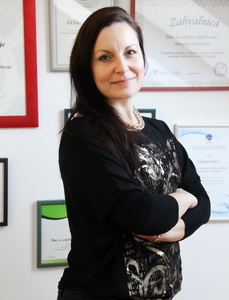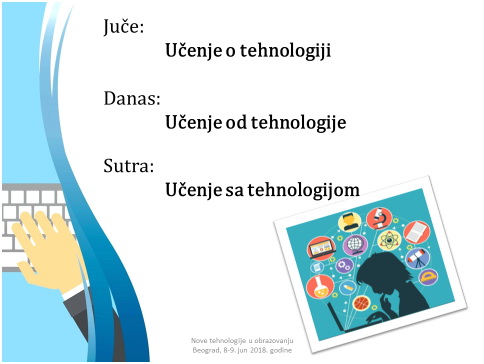 Written by: Dragana Malidžan Vinkić, Education Coordinator, Social Inclusion and Poverty Reduction Unit
Written by: Dragana Malidžan Vinkić, Education Coordinator, Social Inclusion and Poverty Reduction Unit
The Social Inclusion and Poverty Reduction Unit of the Government of the Republic of Serbia once again this year provided support for one of the most popular international conferences “New Technologies in Education”. The conference was organized for the fifth year in a row by the British Council in cooperation with partners.
This year we had the opportunity to hear over 100 international and local lecturers and practitioners, with around 70 presentations, 13 workshops, 3 panel discussions followed by over 3000 visitors during the two-day Conference.
Innovations have been presented in the world of information-communication technologies (ICT) aimed at improving the “development of teaching and non-teaching staff in preschool institutions, schools, universities and other organizations working in education in any form, in order to support creativity and innovation, modernize the learning process and best utilize the opportunities offered by new technologies.” In addition to the lectures, the visitors had the opportunity of visiting the very diverse fair content.
The venue’s four halls hosted excellent examples from practice related to the improvement of curricula for computer science, the use of gamification in education, gender (non)representation in digital professions, the opportunities for programming, the use of smartphones in teaching, as well as digital toys, the use of 3D holograms and artificial intelligence in teaching, coding with and without computers, and many other interesting topics regarding the use of ICT in education.
In addition to the fair, this year the inclusive aspect of this conference covered lectures that were not presented in a separate segment, but shown instead with other examples from the practice of regular schools. Thus the conference sent a strong message that inclusive education represents a part of the regular teaching process and covers all students, not only students from vulnerable groups.
Visitors could learn about the application for children with communication impairments – Lako s Markom developed by the staff of PS “Miloje Pavlović” from Belgrade introducing children to everyday situations in a simple, interesting and educational way (riding a bus, celebrating a birthday, going to the park…). In addition to being intended for children with communication impairments, it is very useful for the development of communication from the earliest age, i.e. from the moment the child starts to put together sentences. The application is free of charge and available through the Google Play store.
The staff of PSS “Vukašin Marković” from Kragujevac have shown us how apps can help overcome fear. Their app is primarily intended for children with autism, but it is also useful for all children, i.e. for situations every child is afraid of – going to the dentist or doctor. This app covers other everyday visits, such as going to the shop or to the hairdressers. This makes it easier for parents to prepare their children, and children know what awaits them. The application simulates a day in the life of a child from getting up, through breakfast, getting dressed, being driven to, for example, a doctor, and receiving a vaccine. The app has proven to be very useful as a means of learning about everyday situations, since children like to play games, and this app lets them play and thus ease tense situations.
The next rather interesting example of the use of ICT to overcome learning difficulties is the dyslexia software lexPad developed by the Inclusive Network. The software is downloadable free of charge from their website, and all interested persons can take part in improving the software in cooperation with its authors.
The “Dr Dragan Hercog” Primary School organizes distance learning for students on medical home and hospital treatments, as well as for students with severe forms of physical disability. As part of the Serbian language classes, i.e. the literary section, students were provided with a virtual field trip and visit to the National Museum in Niš. The students presented their experiences from the field trip on a board created through the free application linoit.
The lecture that left the greatest impression on me was a lecture from Finland. Namely, their history teachers have come up with an idea about how to make their subject more interesting, their students more active, and teaching more modern – they used a very popular form of entertainment called Escape Rooms in teaching. This type of game, also interesting for adults, requires participants to solve riddles and tasks through various clues and strategies. The game requires teamwork, contains an air of mystery, involves various challenges and is limited in time. In addition to the students playing, it stimulates collaborative learning, interaction, the exchange of ideas, and everyone can participate in the process of learning and playing, showing its inclusivity. It requires a well-designed preparation, networking with other teachers, provides for the use of various technologies, from low to high tech, develops 21st century skills (creativity, innovation, critical thinking, problem learning in teaching, information-technology literacy). The entire presentation can be downloaded here.
The above examples from practice have also shown how much we still need to invest in teaching staff, in creating equal opportunities for all and increasing investments in education.
The status of Serbian education regarding the use of information-communication technologies in education was perhaps best illustrated by the staff of PS “Mihajlo Pupin” from Zemun:

*Translation:
Yesterday:
Learning about technology
Today:
Learning from technology
Tomorrow:
Learning with technology
(The text was originally published as the introduction to the 51st Newsletter on Social Inclusion and Poverty Reduction.)
 Government of the Republic of Serbia
Government of the Republic of Serbia















 pdf [271 KB]
pdf [271 KB]
Leave a Comment